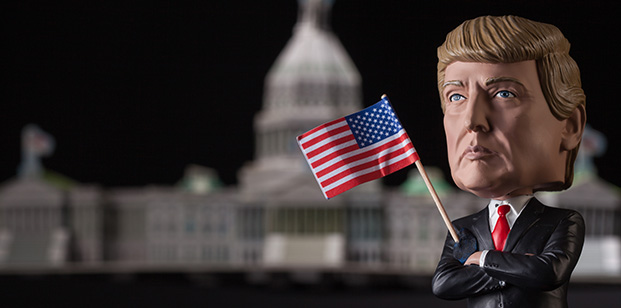There has been a rose-tinted view of the US economy and stock market. It needs to be challenged.
- The assumption that the US economy is invulnerable is naïve
- Trump tariffs may hit US companies, and unpredictability may deter investment
- The US debt burden could slow the economy
The narrative at the start of this year was that while the rest of the world was in trouble, the US was likely to go from strength to strength. Trump’s policies of tariffs, deregulation and lower taxes would super-charge the US economy and stock market. This assumption is starting to look increasingly naïve.
The first problem is that Trump’s shock and awe tactics on tariffs could backfire. The rest of the world is better prepared than Trump might have expected. Canada and China had a list of retaliatory tariffs ready to go as soon as Trump announced his tariff regime. In the end, Trump backed down pretty quickly on Canada and Mexico, and with the merest hint of a concession.
It is also clear that Trump tariffs are going to hit US companies. As the US’s largest company, Apple might have thought Trump would negotiate a carve out, but that has not transpired. Apple shares have been falling on the back of concerns that tariffs will hit profits. With the lion’s share of its iPhones still made in China, the company must make the unpalatable choice of raising prices and seeing a potential hit to demand, or to lower its margins.
Then there’s the economy. Growth appears to be slowing, at the same time as inflation is rising again. While inflation tends to be lumpy at the start of the year, the CPI rose ahead of expectations at 3% this week. GDP growth of ‘only’ 2.3% in the fourth quarter was largely driven by a buoyant consumer – it is debatable whether this can last in the face of rising inflation. Equally, it is clear than unlike, say, the UK consumer, this consumer strength is largely debt driven. The aggregate debt balance on US credit cards has risen over 50% since 2021.
Then there is the government debt. The higher inflation report has raised the 10 year Treasury yield to 4.64%, its highest level since April last year. That raises borrowing costs for an already highly indebted government. It is plausible that Trump will lower the deficit by attacking the USAID and schools budget, but it seems unlikely to have a material impact. Then there is the general unpredictability of the administration itself. How long before that weighs on bond markets?
Perhaps most worrying of all, it was not a particularly inspiring earnings season from the largest companies in the US market. Alongside Apple, Amazon, Alphabet and Microsoft all saw some weakness in their results. The CNBC Mag7 index is now at its same level as in September last year. It is worth noting that over the past three months, the S&P 500 is down 1.15%, while the FTSE All Share is up 8.3% and the Eurostoxx 50 is up 14%.
America isn’t looking so great after all.









